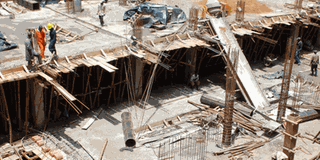Construction sector hit by high inflation

What you need to know:
The high costs could worsen the housing deficit in the country.
Growth in the construction sector is set to face a setback given the soaring costs of building materials resulting from high inflationary pressure.
According to the Construction Sector Indices released by the Uganda Bureau of Statistics last week, costs in the construction sector rose by 35.3 per cent in September 2011 compared to the same period the previous year.
The rate is also higher than that of April this year when inflation in the sector stood at 19 per cent. Uganda had witnessed an unprecedented construction boom in the past five years, with the sector said to have been growing at about 13 per cent per annum.
The once blossoming sector is now being threatened by the escalating prices of building materials including cement, paint, iron sheets, metal, tiles, steel bars, timber, electrical wire and bricks among other building materials that now cost a fortune.
Mr Peter Opio, a principal statistician in charge of energy and infrastructure at Ubos attributed the rise in input prices in the sector to the increasing pressure on the cost of production resulting from the weak shilling against the dollar and high fuel prices which have pushed up transportation costs.
The retail price of a 50-kilogramme bag of cement for instance has increased by Shs7,000 from Shs23,000 in January this year to between Shs29,500 and Shs30,000 at several retail outlets across the country.
The price of iron sheets on the other hand has increased to between Shs23,500 and Shs45,000 depending on the gauge, Shs25,000 for steel bars while a five litre tin of paint costs between Shs30,000 and timber Shs50,000 depending on the type.
Fuel prices which dictate the price of commodities have been rising since January. The cost of diesel has for example skyrocketed to Shs3,600 per litre from Shs2,200 in January while a litre of petrol now costs high Shs3, 900 compared to Shs2, 700 at the start of the year.
The escalating prices of building materials mean that people undertaking construction projects are now paying more for the same building materials compared to the same period last year. This is expected to push prices of either renting or buying a house further up.
Players said high costs in the sector have slowed down growth in the sector as some projects have been stopped and many prospective house builders have either postponed their plans or reduced the unit size.
The President of Association of Real Estate Agents Uganda (AREA), Mr Vincent Agaba, explained that the rising costs in the sector are constraining the supply side of affordable housing units. “The capacity to provide low and affordable houses on the market is reducing. Developers are putting fewer houses on the market because of rising costs,” he told Daily Monitor.
It is feared that high costs could also worsen the housing deficit in the country as most people may not be able to pay the high prices given that prices in other sectors have also increased significantly. Uganda has a housing deficit of over 550,000 units. About 160,000 of this backlog is in urban areas.




